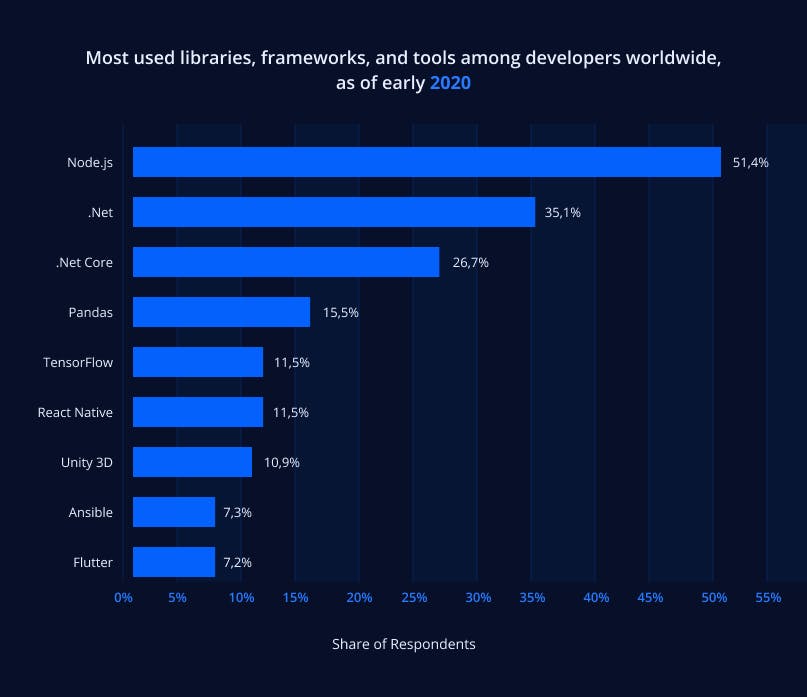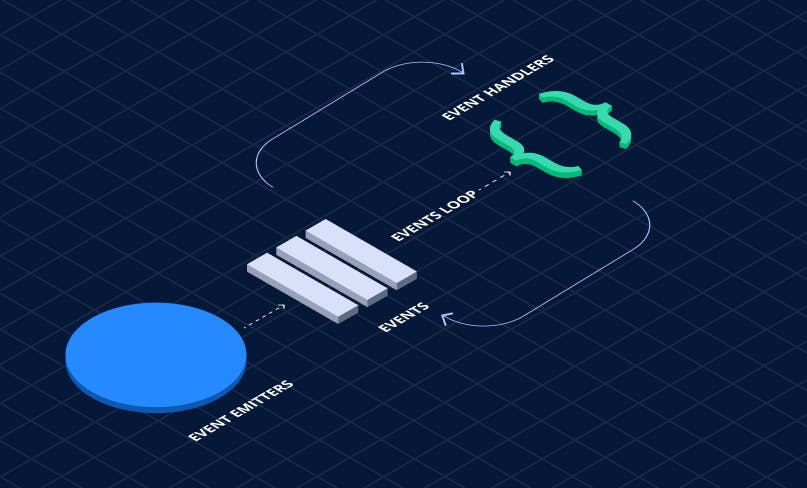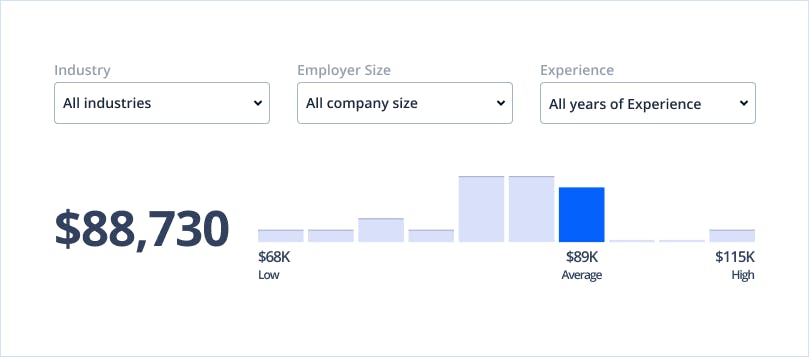How to Hire Node JS Developers: Under the Microscope
Looking to hire Node JS developers? In this article, you will find out how to interview, where to find them, how much do they cost, and so on.
Node.js enables using JavaScript to develop server applications. In practice, Node.js is a software platform based on the V8 engine that converts JavaScript to machine code.
V8 is a Google engine with open source code, developed with С++. The goal of the V8 is to increase JS execution efficiency in web browsers.
According to Statista findings, Node JS leads among the most used libraries, frameworks, and tools.

In this article, we will discuss how to hire Node JS developers.
Node JS developer responsibilities
When you hire Node js developers, you should consider tasks they’re going to fulfill. Probable tasks might include:
- Developing server-side logic.
- Ensuring high performance and responsiveness to requests from the front-end, as well as integrating the front-end elements into the application.
- Connect backend code to the frontend, create new internal and public API endpoints, and modify existing services to support additional functionality.
- Maintenance of the central database.
- Work with cloud-based services.
- Writing and execution of UNIT-tests.
Node JS developer skills
To accomplish project assignments a developer needs certain skills required to address these tasks. Skills are divided into soft and technical.
Soft skills are required to make the working process efficient. Read our article Why Soft Skills Matter When Hiring a Software Developer to learn more about what soft skills are, why they are important, and what soft skills should be considered while hiring a developer.
Technical skills are directly linked with application development.
Did you know that Node JS is a minimalistic platform? Mastering JS and familiarization with the node documentation should be enough to understand it. Within six months, a developer can get into all the necessary details and become a well-rounded team member.
Must-have tech (hard) skills of Node JS developers:
- Proficient knowledge of node js.
- Knowledge of JS / TypeScript.
- Ability to work with packages utilizing NPM or Yarn.
- Experience in work with Express.js, Nest.js, Passport.js, and other libraries/frameworks used in conjunction with Node.js.
- Ability to work with Git/Github.
- Experience in work with databases. For instance, MongoDB, MySQL / PostgreSQL).
Required skills fully depend on the project specifics. Add more skills to vacancy requirements if they are needed for a project.
Top 10 Node.js packages every developer need to know
When a developer is on the project and needs to implement frequently used functions, most likely, a ready solution will be used. To make work with ready solutions more convenient they are spread in the form of packages. Thus a package is a set of functionalities.
Node js developers benefit from more than a million packages with open source code, available in NPM (Node Package Manager). The most popular packages lie at the base of many applications. 2018 NPM report findings state that 97% of application code is created from NPM. Therefore a developer doesn’t write a code for thousands of modules and saves hours of development time.
When you hire Node js developers, they should be familiar with the most popular NPM packages. Let’s briefly cover 10 of them:
Lodash – is a utility library that makes JavaScript easier by taking the hassle out of working with arrays, numbers, objects, strings, etc. Weekly Downloads: more than 39 million.
Chalk – a module that is used to composable API where you just chain and nest the styles you want. Weekly Downloads: more than 102 million.
Commander – complete solution for node.js command-line interfaces. Weekly Downloads: more than 62 million.
Bluebird – fully-featured promise library with a focus on innovative features and performance. Weekly Downloads: more than 21 million.
Async – module with powerful utility functions for working with asynchronous JavaScript. Weekly Downloads: more than 37 million.
Express – Fast, unopinionated, minimalist web framework for node. Weekly Downloads: more than 16 million.
- Gulp – Streaming and fast build system that favors code over config. Weekly Downloads: more than 1,3 million.
- Webpack – module bundler. The main purpose of a webpack is to create a bundle of javascript files for usage in the browser. Weekly Downloads: more than 16 million.
- Jest – javascript testing framework designed to ensure the correctness of any JavaScript codebase. Weekly Downloads: more than 12 million.
- Debug – tiny JavaScript debugging utility modeled after Node.js core’s debugging technique. Weekly Downloads: more than 113 million.
If you have a wish to dive deeper into NPM packages we recommend to you go directly to Github. There you can study in detail the packages that might get handy for your project and which of them a developer should be familiar with correspondingly.
If you find it difficult to reconcile the specifics of your project with necessary libraries you should consult your CTO. If you don’t have one – hire. Our article How to Hire a CTO for a Startup and Not to Fail covers in detail how to hire a CTO and why you need him.
How to interview Node JS developers
Developers can be divided into three levels of seniority – junior, middle and senior. The revel reflects experience, expertise, problem-solving skill, income level, etc.

Interviews will help to define the exact level of a developer and let you understand if this is a good match for the project or company culture.
We divided questions into three levels of developers:
Junior Node JS interview questions
Q1. How many types of API functions are there in Node js?
A1. You can find two types of API functions in Node.js, namely
Asynchronous, non-blocking functions Synchronous, blocking functions
Q2. What is package.json?
A2. Package.json file in Node.js is “the heart” of the whole application. This is a manifest file containing project metadata where we define package properties.
The minimal package.json can look as follows:
{
"name" : "barebones",
"version" : "0.0.0",
}
The name reflects the name of your project (package). If you plan to publish your project name and version together form an identifier that should be unique.
Q3. What is the event cycle in Node.js and how it works?
A3.

The event cycle in Node.js processes all the asynchronous callbacks in the application.
Q4. What is the error-first callback in Node.js? A4. The error-first callback is used to transfer errors and data.
var post = new Post({title: ‘test’});
post.save(function(err,savedInstance){
if(err){
//handle error and return
}
//go ahead with ‘savedInstance’
});
The first argument of these functions is an error object, and sequential arguments present related data. Thus we can check the first argument (object error) to check if something went wrong and trace the need for a fix.
Middle Node JS interview questions
Q1. Explain what module.exports is used for.
A1. module.exports is an instruction informing Node.js about what code fragments (functions, objects, lines, etc.) should be “exported” from this file to provide access to the exported code for other files.
Q2. What is your understanding of callback hell?
A2.
- Also known as Pyramid of Doom;
- This is the template, requested by nested reverse calls that are unreadable and bulky;
- Usually is contains several nested callback functions, that in their turn complicate reading and debugging of the code.
irstFunction(function() {
secondFunction(function() {
thirdFunction(function() {
// An so on...
});
});
});
Q3. What is the difference between spawn () and fork () in Node.js?
A3.
- spawn() – is used to launch system commands
- fork() – is a special instance of spawn, that runs a fresh instance of the V8 engine.
Q4. How does assert work in Node.js?
A4.
- Assert is used to write tests;
- It provides a callback only in case when one of the launched test cases runs into an error;
- Checks, if the transferred value is true, for instance, assert(true), means that everything is fine, and assert(false) speaks in favor of an error.
Senior Node JS interview questions
Q1. What is EventEmitter in Node.js?
A1. EventEmitter – is a class from the events module that facilitates connection/interaction between the objects in Node.js. EventEmitter lies at the base of asynchronous event-driven Node.js architecture. The idea is quite simple: named events are emitted and call out previously registered listeners.
Q2. What is the difference between process.nextTick() and setImmediate()?
A2.
- process.nextTick() – enables execution of transferred callback-functions right after the current function execution. Callback-functions transferred to process.nextTick() are usually called in the end of the current executed cycle.
- setImmediate() – callback-functions will be called in the following cycle after processing of input/output events.
Q3. Explain what are the streams in NodeJS and what are the kinds of streams?
A3. Stream- data transfer in small parts making it possible to process files of quite a significant volume and utilize small ram capacity.
There are 4 types of streams:
- Readable – streams from which data can be read.
- Writable – streams to which data can be written.
- Duplex – streams that are both Readable and Writable. The process of reading and writing is run independently.
- Transform – the variety of Duplex. Streams can change data when reading and writing.
Q4. What is Linting?
A4. Linting is a process of source code check for probable errors. Errors can be related to:
- Formatting discrepancy;
- Non-adherence to coding standards and conventions;
- Pinpointing possible logical errors in your program.
Coding challenge
The coding task is the last but not least part of the interviewing process. Here as well we have two news the good and the bad one. The good news – anyone can learn to code. The bad news – few can code well. Therefore, you should practically check how a developer works with the technology.

Read our new article Top 8 Best Coding Interview Platforms. You will learn what a coding task is and where to search for coding tasks for developers.
Node JS developer average salary
Years of experience, hiring model, and location influence individual developer rates. Therefore, the annual salary of Node.js developers varies from $68,000 to $115,000.

Consider the budget you plan to spend when you want to hire Node js developers.
Based on the data from Neuvoo and Glassdoor we provide Node.js Developer annual salary (US average annual salary without additional cost)

Depending on the project, budget, and personal preference, you have several options to collaborate with a developer. They include in-house developers, freelance developers, or dedicated developers.
Read more about each model in our article In-house vs Freelance vs Dedicated Software Developers.
Summing up
We have tried to cover all possible aspects of how to hire Node js developers. Therefore, this article can be used as a guide. Should you have any questions, we are always happy to answer and help you create something special.

